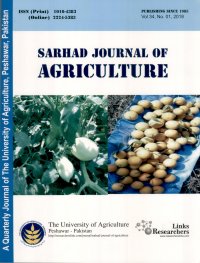Assessing the Behaviour of Pakistani Rice Producers under Exchange Rate Variability
Assessing the Behaviour of Pakistani Rice Producers under Exchange Rate Variability
Syed Rashid Ali1*, Saad Uddin Khan1 and Ahmed Raza ul Mustafa2
ABSTRACT
This study tries to assess the Pakistani rice producer’s behaviour under the exchange rate volatility. The exchange rate variability is a risk which may force the producers to change their production preferences. The Cobb-Douglas production function used to examine the functional association between exchange rate variability and behaviour of Pakistani rice producers. The Exchange rate volatility is measured through the Moving Average Standard Deviation and time-series data from 1981 to 2018 collected from various sources. This study uses the Johansen Co-integration and Vector error correction model to assess the short run and long run association between the exchange rate variability and rice production in Pakistan. The results confirm that the appreciation in the exchange rate will adversely affect rice production in Pakistan. This negative and significant relationship confirms the risk-averse behaviour of Pakistani rice producers. Parameters stability is checked by the Cusum and Cusumq statistics. Policymakers, when designing policies to promote rice production, should consider the exchange rate volatility.
To share on other social networks, click on any share button. What are these?








